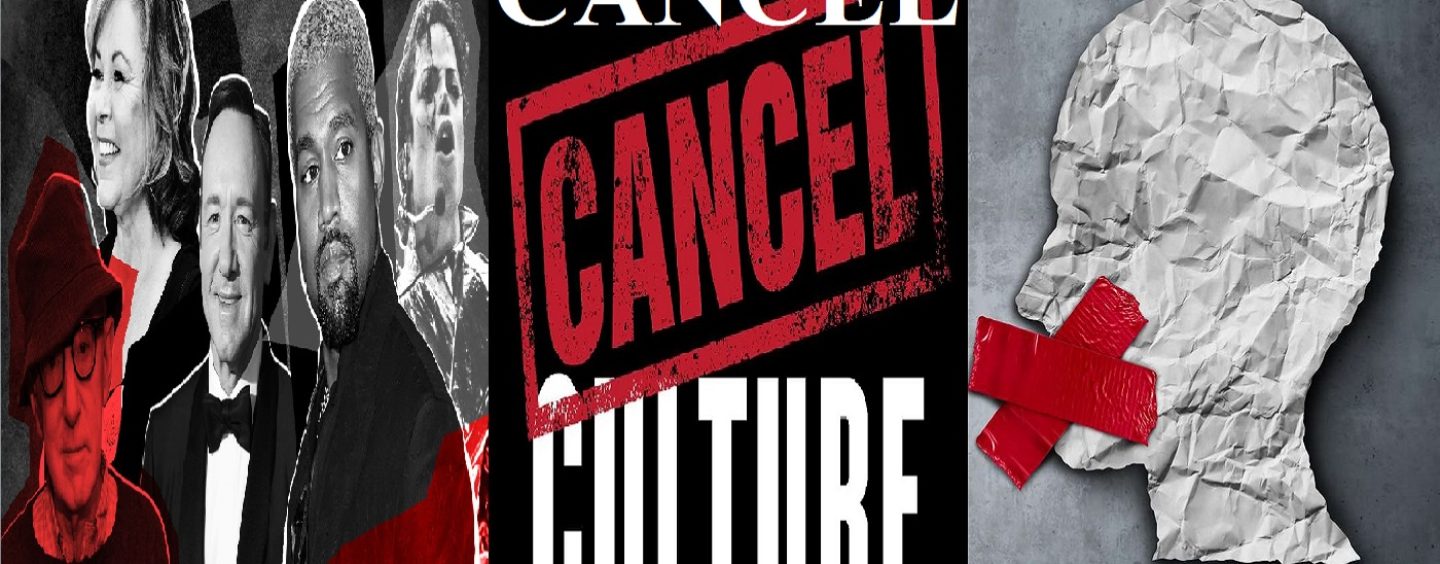
Why It Is Time To Cancel Cancel Culture Before It Destroys Society As A Whole! (Live Broadcast)
by Tj Sotomayor November 28, 2022 0 commentsGiving Power To Idiots!
By: Tommy “Tj” Sotomayor
In March of 2020, famous actress Vanessa Hudgens made a video commenting on the Coronavirus that many viewers deemed “insensitive”. “Coronavirus: Vanessa Hudgens ‘canceled’ for trivialising pandemic response”.
This headline published by NewsHub was not the only of its kind-many entertainment news sources began debating the question of whether or not Vanessa Hudgens would officially be ‘canceled’.
This instance provides a recent example of a popular practice referred to as “cancel culture”: withdrawing support-thus, canceling-from a celebrity, company, or brand in response to an offensive or controversial remark or action.
Cancel culture falls under the branch of public shaming, as it often spreads on social media. As time passes, however, cancel culture seems to be causing more harm than good in the media.
For starters, cancel culture merely serves as a way for fans to boost their sense of confidence.
Many people jump at the opportunity to criticize and “call out” seemingly perfect public figures any chance they get-because the less likable someone else is, then the more likable you become, right? For some, perhaps that is the case, but that does not justify blacklisting celebrities for one simple mistake. To set the record straight, serious offenses like sexual assault, racism, and other obscene crimes should not warrant forgiveness. However, everybody says things they regret and with celebrity’s entire life public knowledge, it’s easy for fans to forget how much pressure they endure to satisfy the public’s expectations.
Similarly, some of the actions celebrities are ‘canceled’ for took place before they rose to fame. For example, one celebrity began receiving hate for a video filmed as a teenager, in which he discussed a controversial topic. He responded with an apology, explaining that he was naive at that age and no longer agreed with what he had said in the video. Another side of this applies to celebrities who are teenagers now.
With the recent popularity of Tik Tok, a new group of famous teens has emerged. It’s common knowledge that teenagers are notorious for being impulsive and making mistakes. In the past few weeks alone, there have been a handful of threats of ‘canceling’ a few Tik Tok stars, one of these being Nessa Barrett. Nessa’s offense: posting a video of her dancing, but the song she was dancing to was a man reading a passage from the Quran.
Many fans took offense to this post and she eventually deleted the video. However, after she ended her first apology attempt with “I’m sorry… I think”, fans felt unsatisfied. People began ‘dragging’ her on all social media platforms and she soon after released another apology that gained her some forgiveness. It appears the internet has granted Nessa a second chance, as she still has six million followers on Tik Tok. This is a prime example of how cancel culture can be ruthless.
Lastly, society needs to accept that celebrities can have their own opinions. Though these views may not align with that of their fan base, it does not justify ruining their career. However, opinions perceived as overly offensive, racists, homophobic should be kept quiet. Ordeals such as supporting one political party over another or being the face of a cause should not be reasons to trash a celebrity’s image.
Often, someone may discover a celebrity who fights for a cause they do or share a view with them, growing in admiration. But this new fan might then learn that the same celebrity also advocates for a belief that they oppose and may try to bash them for holding that opinion. This should not be the case because celebrities are entitled to their individuality and their own set of values. Overall, if someone considerably disagrees with a celebrity’s beliefs, then they should stop supporting them, rather than trying to blacklist them.
In summary, fans must learn to humanize celebrities and public figures to kill the spread cancel culture and benefit the atmosphere of the media.
Why ‘cancel culture’ doesn’t always work
Name a celebrity who has ever said or done anything remotely controversial – they’ve probably been canceled.
It’s a growing phenomenon that’s left almost no one unscathed, from comedians and actors to musicians and TV hosts.
Some people rail against this “cancel culture” while others say it’s necessary. And a lot of people just have questions.
Here are some answers.
What does it mean to cancel someone?
The dictionary definition of “cancel,” per Merriam Webster, is to “destroy the force, effectiveness or validity of.”
When people say they’re canceling a famous person, that’s essentially what they’re trying to do. They want to take away their power or their cultural capital. They want to diminish their significance, whether it’s a personal boycott or a public shaming.
Does canceling actually work?
Eh. It depends.
When was the last time you saw Kevin Spacey in a new movie or on TV? When was the last time you heard anything about him that didn’t involve allegations of misconduct?
After being accused of sexual assault on Nantucket in 2017, Spacey hasn’t done any new projects. His latest movie was 2018’s “Billionaire Boy’s Club,” which was filmed before the allegations were revealed. The Oscar-winning actor was kicked off the hit show “House of Cards” and cut from 2017’s “All the Money in the World,” a movie he’d already filmed.
Since then, the only news about the actor has been on his sexual assault case.
R. Kelly has also been scrubbed from recent cultural relevance. The singer faces numerous sexual assault and abuse charges, and Spotify has removed him from its playlists. To sing an R. Kelly song now is almost taboo.
Filmmaker Woody Allen, who has been accused by daughter Dylan Farrow of sexually assaulting her, lost his movie deal with Amazon earlier this year. Roseanne Barr’s TV show was canceled last year after she went on a racist Twitter rant. And Shane Gillis was fired from “Saturday Night Live” this month after some past racist jokes resurfaced.
But the truth is, most attempts at canceling someone don’t really work like that. Many people, for example, have tried to cancel Taylor Swift over a series of perceived missteps. But she’s still out there, making music. She’s not really canceled, not in the way Spacey or Kelly are.
Then there’s Kanye West. His very public support of President Donald Trump – at a time when some people of color have felt victimized by the President’s comments – shocked fans. And then West went off and called slavery “a choice.”
What came next for West? Cancellation, right?
The truth is a bit more complicated. Some people certainly tried to cancel the rapper by swearing off his music and criticizing his viewpoints.
But let’s be honest. Many other people still bump Ye’s songs, and his recent Sunday Services have garnered huge crowds – including actor Brad Pitt. Ultimately, Kanye proved just too big to cancel.
What about Michael Jackson? How do you cancel a legend?
Though the allegations of sexual assault surrounding Jackson are serious, can you really cancel someone whose influence runs so deep and who is so omnipresent?
Jenna Wortham, a culture writer for the New York Times, contemplated this question on the podcast “Still Processing.” She says she’s managed to cut out such entertainers as Allen, Louis CK and Chris Brown – but Jackson is still everywhere. His songs influenced generations of musicians. It simply isn’t possible to totally cancel him.
“[Cancel culture] doesn’t really work,” Wortham says. “You can’t just cut problematic people and problematic cultural properties or entities out because it’s whack-a-mole, right? You’re dealing with the symptoms of a sick society rather than actually treating the disease.”
Canceling also doesn’t undo the harm these people have done and doesn’t prevent them from doing it again, Wortham says. She cities the example of Chris Brown, who assaulted then-girlfriend Rihanna in 2009 and continues to see musical success despite continued allegations of assault and rape.
This, in a lot of ways, is what cancel culture has become. It’s less about eradicating the offender and more about giving the offended a personal catharsis.
Is cancel culture going too far?
Some people argue that cancel culture is justified because celebrities are facing repercussions for their actions. Others complain that it’s is an unfair form of “gotcha.”
After old tweets surfaced last year that revealed homophobic language by Kevin Hart, fellow comedian Billy Eichner came to Hart’s defense, saying people sometimes rush to judgment. Eichner said he doesn’t like the culture of bringing up past tweets and using them against someone.
“I’m not into people being permanently ‘cancelled’ over something like this,” he said on Twitter. “To me, ‘cancellation’ is childish. I’m into conversation, not cancellation. I’m into owning up to past mistakes, acknowledging blindspots and hurtful remarks, talking through it, discussing it, learning, moving past it and making progress together.”
To cancel someone immediately, Eichner is essentially saying, is denying them that opportunity to learn and grow.
That’s easier to do when the problem is homophobic tweets from a long time ago.
It’s tougher when the issue is bit more muddled. After Gillis was fired from “SNL” for racist jokes he made as recently as 2018, comedian Jim Jeffries said, “This is just cancel culture. The guy shouldn’t have been fired.”
Many people agreed with Jeffries. But others took an opposing stance, like author Mark Harris, who said, “SNL reversing its decision to hire Shane Gillis isn’t a triumph of cancel culture or political correctness or whatever else idiots will label it. It is the swift and appropriate rectification of a mistake.”
So in the end, maybe public cancellations don’t really matter. Brown is still making music. Comedian Aziz Ansari, who was briefly “canceled” after a controversial 2018 article about his behavior on a date, just released a comedy special on Netflix. West is doing … fine. So is Swift. Barr is planning a comeback.
Cancel culture, in most cases, isn’t permanent. But it does let public figures know that fans will hold them accountable.







No Comments so far
Jump into a conversationNo Comments Yet!
You can be the one to start a conversation.Only registered users can comment.